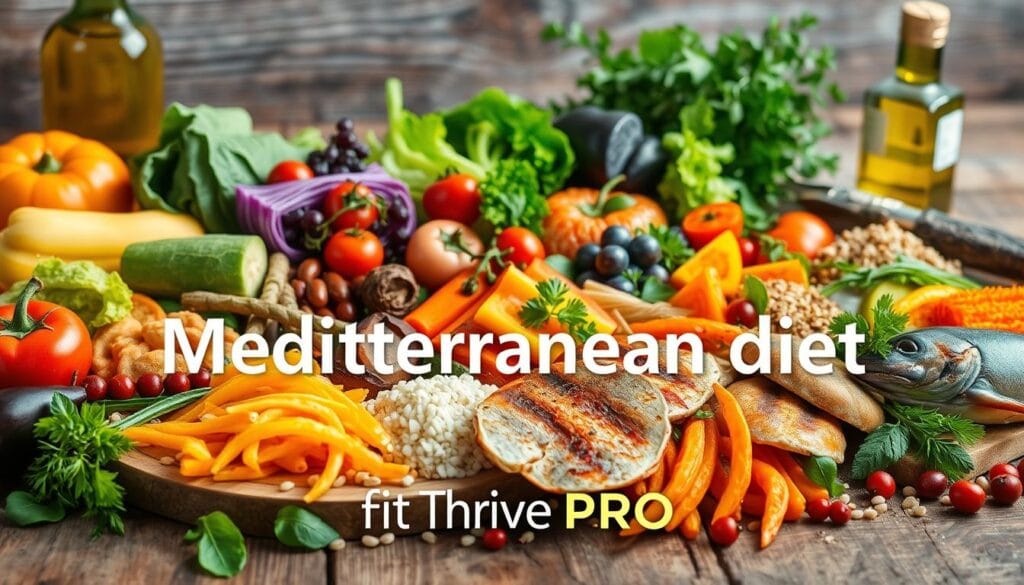
There’s no single diet for everyone when it comes to weight management. But, we can learn from many diets that work well for long-term health1. These diets focus on eating right, controlling portions, and making lasting lifestyle changes.
Starting with a nutritious breakfast is key. Try bran flakes with fruit and nuts. For lunch, go for a turkey sandwich on whole-grain bread with lots of veggies. Dinner could be grilled salmon with spinach. Healthy snacks like Greek yogurt, almonds, or peanut butter with apple slices can also help keep hunger away and support our fitness goals1.
The most important thing is to choose foods we love. This makes sticking to a diet feel like a part of our life, not just a quick fix.
Key Takeaways
- There is no one-size-fits-all weight management diet, but evidence-based approaches can promote long-term health and well-being.
- Balanced nutrition, portion control, and sustainable lifestyle changes are essential for achieving and maintaining a healthy body weight.
- Finding nutritious foods that we enjoy can help make dietary changes feel more like a lifelong lifestyle rather than a temporary fix.
- Incorporating physical activity and behavioral strategies alongside dietary interventions can lead to more successful weight management outcomes.
- Seeking guidance from healthcare professionals can help tailor weight management strategies to individual needs and preferences.
The Importance of Preventing Unwanted Weight Gain
Keeping a healthy weight is key for feeling good. The best way to do this is to stop weight gain before it starts2. Older adults have special challenges, like losing appetite or having trouble eating2.
Being overweight can lead to serious health problems like heart disease and diabetes2. So, it’s important to start healthy habits early to succeed in the long run.
Fostering an Environment for Maintaining a Healthy Body Weight
Building a supportive environment is vital for avoiding weight gain2. Encourage regular exercise, like 150 minutes of moderate activity weekly2. This helps keep muscles strong and mobility good.
Eating right is also crucial. Focus on foods like veggies, fruits, and lean proteins2. These help manage weight and improve health.
Addressing Fundamental Causes of Excess Weight Gain
Understanding why we gain weight is important3. It’s about genetics, behavior, and environment3. Making lasting lifestyle changes is key to keeping weight off3.
Things like portion control and regular exercise help3. Also, dealing with emotional eating is vital for keeping weight off3.
Creating a supportive environment and tackling weight gain causes are crucial steps23. They help prevent unwanted weight gain and keep a healthy weight for life23.
The Role of Physical Activity in Weight Management

Regular physical activity is key for managing weight4. Adults should do at least 150 minutes of moderate activity weekly4. Or, they can do 75 minutes of vigorous activity4. They also need 2 days of muscle-strengthening activities4.
While cutting calories helps lose weight, staying active is vital for keeping weight off4.
Benefits of Regular Physical Activity
Physical activity offers many benefits beyond weight control. It boosts heart health and blood lipid profiles5. It also improves mental well-being5.
Exercise like brisk walking can prevent and manage diseases like obesity and type 2 diabetes4. The calories burned depend on the activity and your weight4.
Incorporating Exercise into Weight Loss Programs
Mixing exercise with diet leads to better weight loss than either alone5. Start with 30 minutes of daily activity, mixing aerobic and strength training4. Sticking to your exercise and diet plans, and tracking your progress, are key to losing and keeping off weight.5
“Physical activity effectively improves cardiovascular fitness, reducing cardiovascular risk factors associated with obesity.”5
Behavior and Lifestyle Modifications for Weight Control
Getting and keeping a healthy weight is more than just dieting. It needs a full plan that includes changing how we act and live6. Changing our habits is key, as these habits often lead to weight gain or make losing weight hard.
Goals of Behavioral Strategies
The main goals of these strategies are to move more and eat less by changing how we eat6. This means joining a program with 12-20 weekly sessions. It teaches us to track ourselves, set goals, and solve problems6.
Combining Behavioral Treatments with Other Approaches
Now, these methods are often mixed with other proven ways for better results6. This mix might include eating less, learning about nutrition, and joining exercise plans6. By tackling both mind and body, people can lose weight for good and feel better overall78.
Good strategies for weight control help us build healthy habits, like:
- Tracking our weight and activity regularly6
- Eating a balanced, low-calorie diet with lots of healthy foods78
- Doing at least 150 minutes of exercise each week6
- Handling emotional and mental triggers that make us eat badly8
By mixing these habits with other proven methods, we can lose weight for good and live a healthier life678.
“The key to successful weight management is not just a temporary diet or exercise program, but rather a comprehensive lifestyle change that becomes a permanent part of one’s daily routine.”
Calorie-Restricted Diets for Weight Loss

Calorie-restricted diets help you lose weight and stay healthy9. They cut down on daily calories but keep nutrients in. Studies show they can lead to big weight loss in the short term9.
Very-low-calorie diets (VLCDs) have about 800 calories a day. They help you lose 3 to 5 pounds a week10. Low-calorie diets (LCDs) have 1,200 to 1,800 calories a day. They also help you lose weight, but slower than VLCDs10.
But, losing weight too fast is not safe. It can cause muscle loss, bone density loss, and stomach problems10. The best way to keep weight off is to eat fewer calories and stay active9.
Research on calorie restriction is ongoing. Scientists are studying how it affects our bodies and health9. Always talk to a doctor before starting any diet plan10.
The Mediterranean Diet: A Healthy Eating Pattern

The Mediterranean diet is known for its health benefits. It focuses on eating fruits, vegetables, legumes, nuts, whole grains, and healthy fats like olive oil11. It also includes some dairy, poultry, and fish, but less red meat and sugar11.
Key Features of the Mediterranean Diet
- Eat at least 3 servings of fruits and vegetables per day11
- Consume 3 to 6 servings of whole grains and starchy vegetables like potatoes, peas, and corn11
- Use extra virgin olive oil, a staple in the diet, in 1 to 4 servings per day with a portion size of 1 tablespoon11
- Include 3 servings of legumes such as beans and lentils per week, with a serving size of ½ cup11
- Eat fish 3 times per week, with a serving size of 3 to 4 ounces11
- Consume nuts at least 3 times per week, with a serving size of ¼ cup nuts or 2 tablespoons of nut butter11
- Limit poultry to no more than once daily, with a serving size of 3 ounces11
- Restrict dairy consumption to no more than once daily, with a serving size of 1 cup of milk or yogurt; 1 ½ ounces of natural cheese11
- Consume eggs up to 1 yolk per day, with a serving size of 1 whole egg11
- Limit red meat intake to none or no more than 1 serving per week, with a serving size of 3 ounces for lean cuts11
- Optionally consume wine, with a guideline of 1 serving per day for individuals assigned female at birth, and 2 servings per day for individuals assigned male at birth, with a serving size of 1 glass (3 ½ ounces)11
Health Benefits of the Mediterranean Diet
The Mediterranean diet is often ranked as the best diet in the U.S. News and World Report12. It matches the American Heart Association’s healthy eating guidelines12. Studies show it lowers dementia risk and improves heart health12.
This diet also helps with diabetes, weight loss, and heart health13. It’s good for babies, too, reducing preterm birth and obesity in kids13.
“The Mediterranean diet consistently ranks as the top diet year after year in the U.S. News and World Report annual ranking of best diets.”12
The Mediterranean diet’s success comes from its health benefits13. It’s a plant-based, whole-food diet that promotes healthy living and prevents chronic diseases.
Intermittent Fasting: An Alternative Approach
Intermittent fasting is an old practice that’s now popular for weight control and health14. It involves eating and not eating in cycles. Studies show it can lower blood sugar, reduce inflammation, and boost metabolism and brain function14.
Understanding Intermittent Fasting Schedules
There are different ways to fast. Some eat only during certain hours or every other day14. For example, some fast for 16 hours and eat for 8. Others fast for 24 hours every other day15. The goal is to pick a schedule that works for you.
Potential Benefits and Considerations
Research shows many health benefits from intermittent fasting14. It can make you live longer, be leaner, and think sharper14. It also improves heart health, physical performance, and tissue health14.
Some studies found obese adults lost weight and improved health markers by fasting15. But, fasting can be hard to stick to, especially with social life and routines14. It’s not for everyone, especially those with health issues14. Always talk to a doctor before starting.
Intermittent fasting is a unique way to manage weight and health14. It’s key to know the different schedules and benefits before starting14. Adding it to a healthy lifestyle can help reach weight and health goals.
weight management diets and Healthy Eating Patterns
Keeping a healthy weight is key for feeling good. Besides the famous Mediterranean diet, other diets help too. The DASH diet lowers blood pressure, and the MIND diet supports brain health by mixing Mediterranean and DASH.
The DASH Diet for Heart Health
The DASH diet is great for heart health16. It’s all about eating more fruits, veggies, whole grains, and lean proteins. It also means less sodium, added sugars, and fats17. Following the DASH diet helps manage weight and heart health.
The MIND Diet for Brain Health
The MIND diet is a mix of Mediterranean and DASH for brain health17. It’s all about leafy greens, nuts, berries, and whole grains. It also means less red meat, butter, and fried foods. Eating this way can slow down brain decline and Alzheimer’s.
Using parts of the DASH and MIND diets can help lose weight and get healthier16. Eating nutrient-rich foods and healthy patterns is the way. This way, you can keep a healthy weight, avoid chronic diseases, and keep your brain sharp.
“A healthy eating plan emphasizes fruits, vegetables, whole grains, and fat-free or low-fat milk and milk products.” – Dietary Guidelines for Americans 2020–2025
For lasting weight control, choose diets that are backed by science and promote health. Learning about diets like DASH and MIND can lead to a healthier life1617.
Low-Carb and Ketogenic Diets for Weight Loss
Many people want to lose weight fast. Low-carb and ketogenic diets are popular for this. The ketogenic diet aims to put your body in ketosis. This means eating less than 50 grams of carbs a day, sometimes as low as 20 grams18.
This diet is mostly fat, with 55-60% of calories coming from it. It also has 30-35% protein and only 5-10% carbs19.
The idea is that by eating fewer carbs, your body burns fat for energy. This can lead to quick weight loss. Some say it also helps control blood sugar and lower heart disease risk19. But, how safe and effective it is over time is still being studied18.
Principles of the Ketogenic Diet
The ketogenic diet changes how your body gets energy. It uses more fat and less carbs. This can cause fast weight loss1819.
But, it might also cause side effects like hunger, tiredness, and mood swings18. It could also increase the risk of kidney stones and osteoporosis18.
Long-term effects, especially for high-risk groups, are still unknown18.
Challenges and Long-Term Sustainability
The ketogenic diet might help you lose weight quickly. But, keeping it up long-term is hard18. Studies show it’s not much different from other diets after a year18.
It’s hard to stick to because of its strict rules and side effects18.
Before starting a low-carb or ketogenic diet, talk to a doctor. They can help based on your health and goals1819.
The Mayo Clinic Diet: A Comprehensive Approach
The Mayo Clinic Diet is a detailed weight management plan made by Mayo Clinic experts20. It focuses on lasting changes, not quick fixes20.
Overview of the Mayo Clinic Diet Phases
The diet has two phases: “Lose It!” and “Live It!”20. “Lose It!” starts weight loss. “Live It!” teaches how to keep healthy habits20.
This structure helps people lose weight and keep it off20.
Focus on Healthy Food Choices and Physical Activity
The diet emphasizes healthy eating and exercise20. It offers many meal plans, like Healthy Keto and Mediterranean, to fit different tastes20. It also has easy workouts at home20.
It combines nutrition and exercise for lasting weight management20. Unlike many diets, it doesn’t count calories20.
“The Mayo Clinic Diet has been featured in 10 out of 11 ‘Best Diets’ categories by U.S. News & World Report 2023, indicating its effectiveness as a comprehensive weight loss program.”20
Thousands of Americans have lost weight with this diet20. It’s easy to use, with a top-rated app and online help20.
Conclusion
Effective weight management needs a mix of actions to tackle unwanted weight gain. It’s key to prevent extra weight by creating a healthy setting and tackling the main causes21. Combining more exercise, changing habits, and eating more plants leads to lasting weight loss21.
Fad diets might work at first, but lasting health comes from lasting lifestyle changes. This is how we keep a healthy weight for good.
Our studies show diet plays a big role in managing weight. Meal replacements, low-carb diets, and high-protein ones work well2122. Psychological and environmental factors also help keep weight off for good21.
Looking into weight management, we see a need for a complete, science-backed plan. By focusing on exercise, healthy eating, and changing habits, we help people control their weight. This leads to better, happier lives2122.
FAQ
What is the best diet for weight loss?
There’s no single “best” diet for losing weight. The healthiest way is to adopt balanced, plant-based eating habits. These habits should be easy to keep up over time.
Healthy meals include bran flakes with fruit and nuts for breakfast. A turkey sandwich on wheat with veggies for lunch is good. Salmon with spinach for dinner is also healthy.
Healthy snacks are almonds, Greek yogurt, or peanut butter with fruit.
How can the military help prevent unwanted weight gain?
The military can help people keep a healthy weight from the start. It’s important to understand why people gain weight. This includes genetics, behavior, and environment.
Creating a healthy environment is key. It helps people keep a healthy weight for life.
What is the role of physical activity in weight management?
Physical activity is key for weight loss. Start with 30 minutes of daily activity. This should include both aerobic and strength training.
Exercise alone may not lead to big weight loss. But, adding it to diet changes works better than either alone.
How do behavior and lifestyle modifications impact weight control?
Changing habits is vital for weight management. People often gain weight due to bad habits. The goal is to increase activity and cut calories.
Behavioral treatment involves 12-20 weekly sessions. It focuses on changing habits for good.
Are calorie-restricted diets effective for weight loss?
Calorie-restricted diets can help lose weight short-term. But, adopting healthy eating habits for life is more important. Replace unhealthy foods with natural ones.
Don’t follow restrictive “fad diets.” They’re not sustainable.
What is the Mediterranean diet and how does it support weight loss?
The Mediterranean diet focuses on fruits, veggies, legumes, nuts, and whole grains. It includes healthy fats like olive oil. Dairy, poultry, and fish are in moderation, while red meat and added sugars are limited.
This diet lowers heart disease, diabetes, depression, and cancer risks. It’s also good for weight loss.
What is intermittent fasting, and what are the potential benefits?
Intermittent fasting involves eating and fasting cycles. It can lower blood sugar and inflammation. It also improves metabolism and brain function.
But, it can be hard to stick to. It may not work for everyone, especially those with health issues.
What other healthy eating patterns can support weight management?
Besides the Mediterranean diet, there’s the DASH diet for blood pressure. The MIND diet combines Mediterranean and DASH for brain health. All focus on natural foods like fruits, veggies, whole grains, and healthy fats.
How do low-carb and ketogenic diets work for weight loss?
Some find low-carb or “high-fat” diets helpful for weight loss. They eat 75-90% fat, 10-20% protein, and 5% carbs. This forces the body to burn fat.
But, long-term use is a concern. More research is needed on their safety and effectiveness.
What is the Mayo Clinic Diet, and how does it support weight management?
The Mayo Clinic Diet is a program for weight management. It has two phases: “Lose It!” and “Live It!”. The “Lose It!” phase helps kick-start weight loss. The “Live It!” phase teaches lasting healthy habits.
The program focuses on simple, enjoyable changes. It aims to lose weight and keep it off, not just quick fixes.
